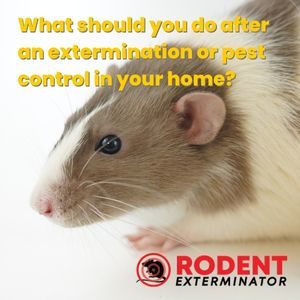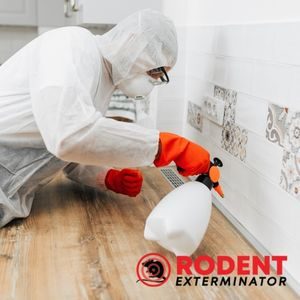A rodent infestation in your home is a very common occurrence, and nowadays there are many types of treatments for such an event.
You should contact the exterminator as soon as possible to schedule a follow-up visit, and then take some time to deep clean your home.
This will help remove any traces of the extermination chemicals and ensure that your home is rodent-free.
What do you do after an exterminator?
There are several things you can do after the professionals have taken care of exterminating all the rodents in your house:
1. Be patient and wait.
The chemicals must sit in your home for several hours in order to be effective. Wait until the recommended hour to return home if you had to quit the premises.
After an eradication, your pest control professional will advise you on how long you should wait before returning inside.
2. Food that has been contaminated should be discarded.
If you leave any food out during the treatment, please be sure to throw it away in your outside garbage cans.
3. Don’t clean after extermination services.
For at least a week after your pest control treatment, resist the impulse to undertake a deep clean of your home.
It may be tempting to clean cabinets and other locations following an exterminator, but this might cause the chemicals to rub off prematurely, reducing the treatment’s overall effectiveness.
Treatments for pest control are frequently tailored to your specific requirements. As a result, you’ll be notified when you can clean again and which places you shouldn’t wash.
4. Keep an eye on your own, your family, and your pet’s health.
Most of us will be aware if we’ve been exposed to a pesticide or other caustic chemical. Among the signs and symptoms are:
- Burning eyes.
- Constant cough
- Having trouble breathing.
- Variations in heart rate.
Although the foregoing symptoms are uncommon, they are not completely unheard of. The majority of pesticides used in the house aren’t extremely harmful to humans.
Unfortunately, this is not always the case with pets. Some pest control firms for homes may use chemicals or solutions that are possibly harmful to pets.
It is important to notify the professional that you have pets so that they use the appropriate methods that do not risk anyone’s health.
5. Fix any leaks or cracks.
Leaks provide an entry point for pests, which might lead to a re-infestation.
Paper can be a source of food for many pests, so don’t leave it lying around.
You should be on the lookout for wet paper (of any kind) and brown bags (used to transport groceries).
Old newspapers and periodicals should not be kept in or near the kitchen.
6. Take precautions.
When handling sprayed surfaces for the first time, put on a pair of disposable gloves. Even when unpacking something, avoid touching any surface with your bare hands.
7. Keep an eye out for rodents.
You’ll probably find dead mice or rats now and again in the days after the treatment, but the frequency will decrease.
Make careful to inspect and clean the issue places regularly.
Rodents that have died can attract other pests, exacerbating your difficulties.
How long after extermination is it safe?
Once the work is over, professional extermination companies recommend staying away from the house for some time.
After the service is completed, they may advise you to leave your residence for a period of 2-4 hours. However, this can vary depending on the type of service and can last up to 24 hours.
It’s critical to wait at least 3 hours before entering your home to allow the pesticide to dry and reduce your exposure.
To air out the house, have a healthy friend or family member be the first to enter and open all the windows and doors.
Allow your home to air out for an hour or two to lessen the possibility of unpleasant chemical side effects.
How long after pest control can you mop?
It’s preferable not to mop as often after treatment as feasible. In terms of protection, the perimeter spray is expected to last 30 to 90 days.
You can still sweep or vacuum to keep the property clean, but it’s critical to maintain the perimeter-treated zone around the wall borders, skirting boards, and kick boards, for example.
In other words, for the first 6-8 weeks, avoid mopping floors right up to the edge of the wall, because you want that invisible pesticide barrier to stay in place as long as possible, because any pest within the house will be exposed to it.
To summarize, following the directions and rules supplied by expert exterminators is critical for improved service efficiency, greater safety for your family and pets‘ health, and the preservation of your household belongings.
After the elimination, you attempt to remain calm. Because the professionals know what they’re doing, they’ll explain what to do after the infestation is over.
If you have any additional questions, do not hesitate to contact your professional and ask everything you need to know.
Rodent Exterminator‘s pest control treatment can keep rodents away for months, but certain pests, such as rats, can still find their way inside after a treatment.
Give our staff a call if you’re still witnessing newborn rats or mice following the eradication, or any other pest for that matter.
We offer complete extermination services that can be tailored to meet the specific needs of each homeowner.
In addition, we have a wide variety of services including post-extermination cleanup. Contact us at 213-431-0890.
